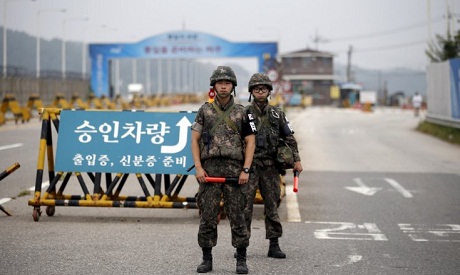
File Photo: South Korean soldiers stand guard at a checkpoint on the Grand Unification Bridge which leads to the truce village Panmunjom, just south of the demilitarised zone separating the two Koreas, in Paju, South Korea (Photo: Reuters)
South Korea is considering withdrawing some troops from its border zone with North Korea as a confidence-building measure after their landmark summit, the defence ministry said Tuesday.
The ministry said it would withdraw some soldiers and equipment at guard posts inside the Demilitarised Zone on a trial basis, and consider a gradual expansion of the pullout later.
"We will push for plans for a full-scale withdrawal in sync with surveys of historical remains and ecological features," it said in a report to parliament.
The 1950-53 Korean War ended with an armistice rather than a peace treaty, leaving the two Koreas technically at war. The DMZ was designated as a buffer zone but the areas to the north and south of it are heavily fortified.
At their April summit, North Korean leader Kim Jong Un and the South's president Moon Jae-in agreed to cease all hostile acts and turn their border into a "peace zone".
Also under consideration is a joint programme with the North and the United States to exhume the remains of war dead buried in the DMZ.
The zone bisects the Korean peninsula and is about four kilometres (2.5 miles) wide. It includes a Joint Security Area (JSA) around the truce village of Panmunjom, where negotiations take place.
The ministry also said Seoul was reviewing plans to reduce guard personnel and firearms in the JSA, "based on the spirit of the armistice agreement".
North Korea's diplomatic overtures began earlier this year with its participation in the Winter Olympics in the South.
In June Kim held a historic summit with US President Donald Trump in Singapore at which he reaffirmed his commitment to work towards the "denuclearisation of the Korean Peninsula".
After the summit, Trump declared the North Korean nuclear threat to be effectively over, although experts say Pyongyang has made no public commitment to give up its weapons.
Short link: